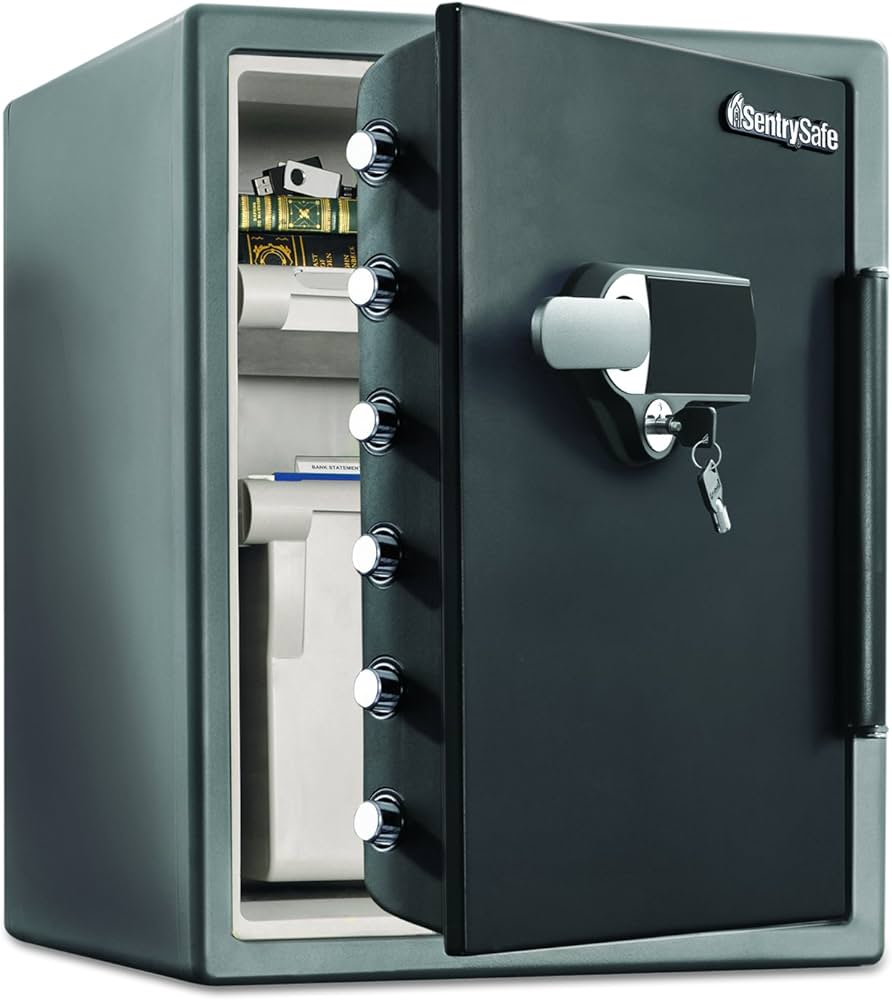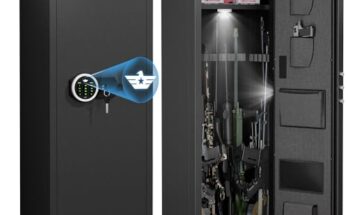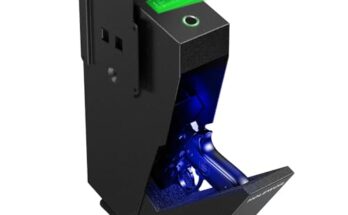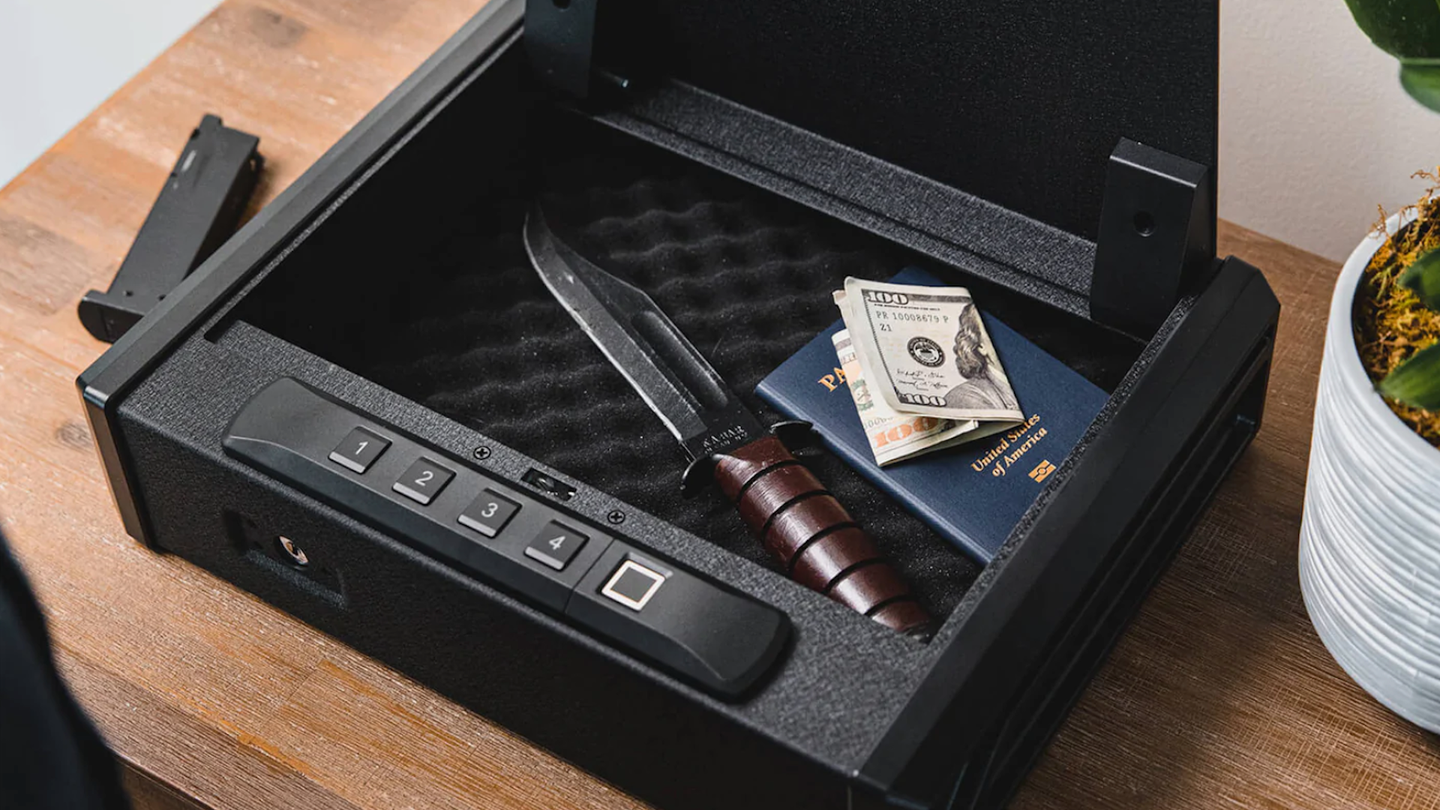Electronic gun safe locks are generally reliable and provide quick access. They offer robust security with user-friendly interfaces.
Electronic locks on gun safes have gained popularity due to their convenience and reliability. These modern locking mechanisms use a keypad or biometric scanner to allow quick and secure access to firearms. Unlike traditional combination locks, electronic locks can be programmed with personal codes, making them less susceptible to being cracked.
They also often come with features like multiple user codes and lockout penalties after successive incorrect attempts. This level of security assurance makes electronic gun safes a preferred choice for gun owners looking to balance accessibility with safety. Understanding the balance of security and practicality is crucial in selecting the right gun safe for responsible firearm storage.

Credit: www.tractorsupply.com
The Evolution Of Gun Safe Security
The Evolution of Gun Safe Security is more than just a trend — it’s a vital transformation. It mirrors a society’s quest to keep firearms secure, while allowing quick access to authorized users. Early safes had simple locks; today, we witness biometric marvels. Explore how this journey unfolded.
From Key Locks To Cutting-edge Biometrics
Traditional key locks started the journey. They were simple but often lacked advanced security features. Biometrics represent a leap in technology. Fingerprints, eyes, and voice patterns now unlock superior protection for firearms, merging convenience with advanced security.
- Mechanical locks – Prone to picking but trusted for years.
- Combination dials – More secure, requiring a memorized code.
- Electronic keypads – Quicker access yet susceptible to electronic failures.
- Biometrics – Provide the highest level of personalized security.
Technological Advancements In Locking Mechanisms
Innovations have transformed locks. Today’s locking mechanisms are smarter and tougher to crack. Some safes feature alarms, tamper alerts, and lockdown modes after failed attempts.
| Feature | Benefit |
|---|---|
| Electronic Keypads | Programmable codes, swift entry. |
| Redundant Locks | Multiple modes of entry. |
| Smart Safe Technology | Remote monitoring, alert systems. |
| Biometric Scanners | Unique physiological traits for access. |
Each advancement embodies enhanced trust in securing firearms. But, dependability still hinges on quality and proper upkeep. Regular updates of electronic components are vital for continued reliability.
How Electronic Gun Safe Locks Work
Understanding the workings of electronic gun safe locks is key for those prioritizing firearm security. These locks offer a blend of convenience and safety for responsible gun owners.
The Mechanics Of Electronic Locks
Electronic gun safe locks rely on circuitry and motorized bolts. Upon entering the correct code, the lock disengages. This simple yet effective mechanism ensures swift access while preventing unauthorized entry.
- Keypad input: The user enters a code on the keypad.
- Signal: The lock’s circuit validates the code.
- Actuator movement: The bolt retracts, allowing the safe to open.
Digital Keypad Versus Biometric Systems
Choosing between keypad and biometric systems is crucial for your security setup. Both have distinct operations and advantages.
| Feature | Digital Keypad | Biometric System |
|---|---|---|
| Operation | Enter numerical code | Scan unique fingerprint |
| Speed | Quick, if code remembered | Faster, with a touch |
| Reliability | Depends on memorization | Subject to reader sensitivity |
| Accessibility | Multiple users with code sharing | Only registered fingerprints |
Keypad locks allow for easy access with a memorized code. They often include a backup key for emergencies.
Biometric systems use fingerprints for entry, offering personalized security. They usually allow for multiple user profiles.
Assessing The Reliability Of Electronic Locks
Many gun owners are making the switch to electronic gun safes. Electronic lock reliability is a top concern. Let’s explore how these locks measure up in terms of durability and potential weaknesses.
Durability And Longevity Concerns
Electronic gun safe locks must withstand daily use. Durability is key. We look at materials and construction. This affects how long they last.
- Steel and anti-drill plates
- Wear-resistant keypads
- Battery life indicators
Better construction means longer-lasting electronic locks. Regular maintenance also plays a critical role in extending lock life.
Potential Vulnerabilities To Electronic Failure
Electronic locks can fail. We identify common weaknesses. These include power failure, hacking, and wear.
| Risk Factor | How it Affects Reliability |
|---|---|
| Power Outages | Batteries die, locks may fail to open. |
| Technological Hacking | Unauthorized access through code manipulation. |
| General Wear and Tear | Components degrade over time affecting function. |
Preventive measures can increase security. Frequent check-ups and secure back-up power sources are important.
Comparative Analysis: Electronic Vs. Mechanical Locks
When it comes to securing firearms, the debate between electronic and mechanical gun safe locks is ongoing. Each type presents unique features, benefits, and drawbacks. Conducting a comparative analysis sheds light on which might be more reliable for your specific needs.
Ease Of Access And User Experience
Assessing the ease of access and user experience is crucial in any comparison of lock types. Here’s how each type fares:
- Electronic Locks: Offer quick entry with the use of a personal code.
- Keypad Entry: Typically backlit, ideal for low-light conditions.
- User Management: Allows multiple codes for different users.
Mechanical Locks rely on physical keys or combination dials. They may not grant as swift access as electronic locks but require no power source.
Security Features And Potential Risks
Understanding security features and potential risks helps in evaluating reliability.
| Feature | Electronic Locks | Mechanical Locks |
|---|---|---|
| Power Dependency | Require batteries or external power sources | None |
| Lockout Mechanism | Temporary lockouts after multiple incorrect attempts | Not applicable |
| Tamper Indicators | Alarms or error messages flag tampering | Physical evidence of tampering |
Mechanical locks lack sophisticated technology which can be an advantage or disadvantage. They’re impervious to electronic failures but don’t offer warnings when compromised.
Electronic locks, while advanced, pose risks such as susceptibility to electronic failures and hacking attempts.
User Testimonials And Expert Opinions
Many gun owners ponder the reliability of electronic gun safe locks. Insights from those who use them daily coupled with professional advice can clear doubts. Let’s explore what they share about electronic lock performance and dependability.
Real-world Experiences With Electronic Locks
Feedback from electronic gun safe users highlights their experiences:
- Speedy Access: Users note quick entry when needed most.
- Keyless Convenience: No more fumbling for keys under pressure.
- Battery Life Concerns: Some mention the need to replace batteries before they drain completely.
User anecdotes reveal that convenience comes with mindfulness about power sources. They recommend keeping track of the battery level to avoid lockouts. Personal accounts mainly praise the ease and swiftness granted by these modern safes.
What Security Experts Are Saying
Security professionals weigh in on electronic locks:
| Expert Insights | Details |
|---|---|
| Advanced Features: | Experts admire the added security layers such as tamper alerts and multiple user codes. |
| Fail-Safe Mechanisms: | They appreciate backup keys and override codes in case of electronic failures. |
| Electronic Versus Mechanical: | Some argue that while electronic locks offer benefits, mechanical locks win on durability. |
Experts suggest choosing safes with both electronic and mechanical override systems. They affirm that electronic locks are reliable with regular maintenance and proper usage.

Credit: www.amazon.com
Enhancing Reliability: Best Practices For Owners
Understanding how to maintain your electronic gun safe is key for ensuring its reliability. High-tech locks offer quick access and strong security, yet require proper care. Let’s dive into how owners can enhance the performance and trustworthiness of their safes.
Maintenance Tips For Electronic Gun Safes
Keeping your electronic gun safe in top condition involves simple, yet vital steps:
- Regular Cleaning: Wipe down the keypad and handle to keep dust and grime at bay.
- Battery Check: Replace batteries annually, or as needed, to prevent lockouts.
- Software Updates: If applicable, install updates from the manufacturer to enhance security features.
- Inspection: Schedule a professional inspection to tackle any wear and tear.
Back-up Solutions And Emergency Protocols
Despite regular maintenance, emergencies can happen. Be prepared with these strategies:
- Secondary Access: Keep a backup key or remember an alternative code.
- Power Loss Plan: Know your safe’s procedure for power failures.
- Emergency Contacts: Have your safe’s support line and a local locksmith’s number handy.
Frequently Asked Questions On Are Electronic Gun Safe Locks Reliable
How Secure Are Electronic Gun Safe Locks?
Electronic gun safe locks offer strong security, leveraging technology such as biometric scanners, digital keypads, and anti-tampering features. Their reliability often matches or exceeds traditional mechanical locks, provided they’re properly maintained and batteries are regularly replaced.
Do Electronic Safe Locks Fail?
Yes, electronic safe locks can experience failures or malfunctions. While electronic locks are generally reliable, they are not immune to technical issues. Some common reasons for electronic safe lock failures include:
-
Dead or Low Batteries:
- Electronic locks are often battery-powered. If the batteries are dead or low, the lock may fail to operate. Regularly check and replace the batteries according to the manufacturer’s recommendations.
-
Electronic Malfunctions:
- Issues with the electronic components, such as wiring problems or circuit malfunctions, can lead to lock failure. Exposure to moisture or extreme temperatures may also contribute to electronic malfunctions.
-
Keypad Issues:
- Faulty keypads or buttons can result in incorrect code entries or the inability to input the correct combination.
-
Programming Errors:
- Incorrect programming of the electronic lock, whether during initial setup or subsequent changes, can lead to lockout situations or failure to open.
-
Time Delay Feature:
- Some electronic locks have a time delay feature for added security. If not configured or managed properly, this feature can lead to delays in opening the safe.
-
Lockout Due to Incorrect Entries:
- Electronic locks may have a lockout mechanism that activates after a certain number of incorrect code entries, adding an extra layer of security.
-
Mechanical Issues:
- In some safes, electronic locks are connected to mechanical bolts. Mechanical issues, such as jammed bolts or misalignment, can prevent the safe from opening.
-
External Interference:
- Electronic devices nearby emitting radio frequency interference (RFI) can potentially affect the operation of electronic locks.
It’s important to note that while electronic locks can fail, they also offer convenience and security features. Regular maintenance, proper programming, and following the manufacturer’s guidelines can help minimize the risk of electronic lock failures. If you encounter issues with your electronic safe lock, refer to the user manual for troubleshooting steps, or contact the manufacturer’s customer support for assistance.
How Long Do Electronic Locks On Safes Last?
Electronic locks on safes typically last between 3-5 years before needing a battery change or maintenance. Regular use and the quality of the lock affect longevity.
How Reliable Are Electronic Locks?
Electronic locks are generally reliable, offering convenient security with features like keyless entry and audit trails. Proper maintenance and regular battery changes ensure their consistent performance. However, like all technology, they can be susceptible to technical issues or hacking.
Conclusion
Electronic gun safe locks blend innovation with security measures, offering a mix of swift access and safeguarding. Their reliability hinges on quality and proper usage, adapting to users’ varied needs. Ultimately, selecting a reputable brand and routine maintenance are key to ensuring lock dependability.
Trust in technology meets peace of mind for responsible firearm owners.




